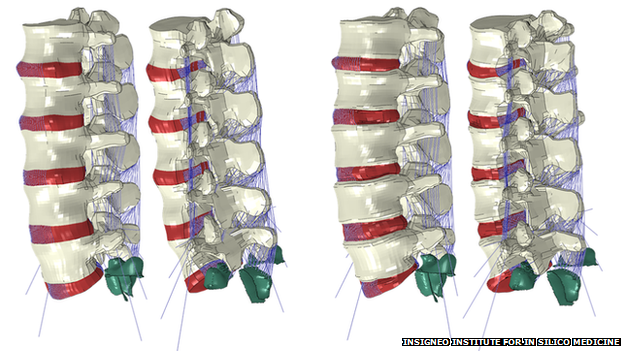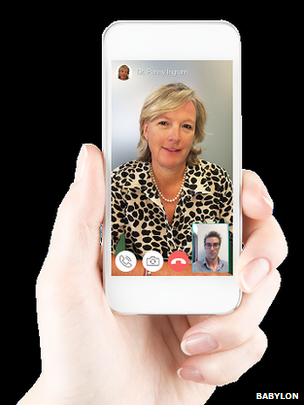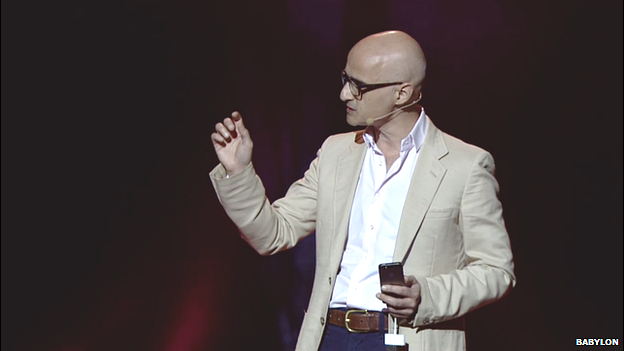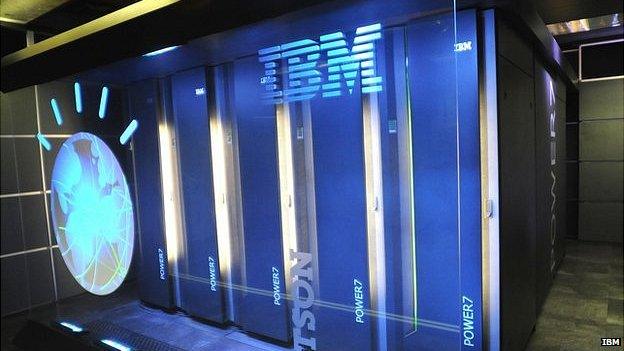AI, robots, pocket doctors: Patient-centred health tech
- Published

By using models of the body, surgeons can test out potential treatments and see how effective they are
What if talking to your GP was as easy as ordering a cab on your smartphone?
The cost of medical care, waiting times and disparity in healthcare provision is a source for pessimism for patients around the world - but technology is trying to make things a little easier.
With up to two weeks' waiting times to see GPs, and doctors warning that things could get worse, access to healthcare in the UK is a hot topic.
Dr Ali Parsa launched the Babylon healthcare app in April. Users have 12-hour access to GPs, six days a week. They can either send in pictures or have a video conference call with one of its doctors or nurses.
Doctors then send a prescription to a pharmacy close to the patient, if required, or recommend the user goes to see their own doctor, or advise specialist treatment, for example with a dermatologist.

Babylon users rate doctors after video consultations
"As much as 95% of healthcare has nothing to do with hospitals. What people really want is conversation and diagnosis," says Dr Parsa.
"Our current system is inconvenient and expensive. But phones are very, very powerful.
"Why don't we take all the healthcare anyone needs and put it on the phone?"
About 70% of the world's population has no access to healthcare so many die from simple infections, he says, but "they do have mobile phones".
Users can rate the doctors after each video consultation - and consistently below-par scores will see professionals struck off Babylon's records.
Administrative staff deal with the paperwork so the GPs can focus on treating patients from the comfort of their own home, says Dr Parsa.
He says the app has grown "exponentially" since it was launched five months ago and is now planning to take the app across the world "as quickly as we can", focusing on the Middle East and Africa.
"We are now looking at parties who have a large customer base, such as supermarkets, big public institutions, mobile phone companies and newspapers.
"If people can go into Tesco and by an iTunes card, why can't they buy a Babylon access card?" he says.

Dr Ali Parsa says access to healthcare should be as easy as picking up an iTunes card in a supermarket
Robotic surgery
It might sound like a scene from cult film Alien, but robots have been developed with the ability to carry out surgery.
Dr Patrick Finlay, at the Institution of Mechanical Engineers, has been working on the robots. He says: "In 20 years from now, medical students will find it enormously amusing that we were sticking our hands in patients."
He says surgeons sometimes cannot operate on a cancer patient's brain if a tumour is too close to a vital area, due to fear of damaging the area.
.jpg)
Robots can make operating a much less traumatic experience, with wounds only needing sticking plasters
And operations can be high-risk due to the invasive and imprecise nature of the surgery and the danger cancer cells will be spread during removal.
"Robots are 3-4mm in diameter so they can go straight to the tumour," he says. "They have much more accuracy and there is much less collateral damage."
He says robots could also be used for keyhole surgery in the gut, meaning fewer surgeons would be needed.
Such a procedure would leave a patient with a sticking plaster over a pinhole wound and able to leave the same day, instead of long hospital stays and recovery time.
Artificial intelligence
Across the Atlantic, global technology giant IBM's artificial intelligence supercomputer Watson is being used to try to improve patient care.
The aim is to reduce the number of deaths from medical errors, which it says is the third-biggest killer in the US.
The supercomputer has the ability to learn, like a human. It can understand natural language, read, view videos and reason.

IBM's Watson in 2010, the year it won US TV show Jeopardy. The company says it is now the size of three pizza boxes
It is updated with the latest medical research - which some reports estimate at 5,000 new papers a month - and helps doctors make decisions about patient care based on that information.
"Both research and effective cancer treatment requires a tremendous understanding of medical literature, population health trends, patient histories, genetics and more - too much for any one person to digest," says Eric Brown, director of Watson Algorithms.
"For example, cancer centres typically run hundreds of clinical trials at any given time, but matching the right patient to the right trial is actually quite complex and difficult. Watson identifies patterns in patients, matching them to the clinical trial criteria much more quickly and efficiently."
IBM cites an example where Watson detected a genetic mutation in a cancer patient and pulled up a recent discovery that the current recommended treatment for that cancer is not effective in the presence of the mutation.
The project's lead doctor, Jose Baseiga, said that less than 1% of doctors would have known about the treatment's ineffectiveness without Watson.
Another example is genomics, says Mr Brown, with the possibility of DNA-based personalised treatment.
"The area of genomics is a perfect illustration of the information challenges in cancer," he says.
"Despite groundbreaking discoveries around genetic drivers of disease, few patients benefit from DNA-based treatment options. Even if a patient's genome is mapped, few doctors have access to the tools they need to quickly turn that information into better treatment decisions.
"If you can deliver the right information at the right time, you can literally save lives. And cancer patients don't have any time to lose."
Modelling your health
A European initiative is also battling the problem of keeping doctors up-to-date and providing personalised treatment.
Medical systems tend to be highly specialised and separate - with a doctor for the liver, one for the heart and so on, says Dr Keith McCormack at the Insigneo Institute at the University of Sheffield.
Collaboration can be difficult in a busy hospital and so patients can be left feeling frustrated as a lack of communication between specialists can mean that treatments for different conditions can negatively impact each other.
Dr McCormack says this is particularly troubling for older people, who are often suffering from several different degenerative diseases at once.
He is part of a European Commission project that aims to improve the diagnosis and treatment using computer simulations of the human body and disease.
.png)
Models of coronary arteries could help doctors understand coronary heart disease and tailor patients' treatment
The body's muscle, heart and vein, skeletal and nerve systems are all modelled allowing doctors to enter a patient's symptoms and their history to see what care works best for them.
Dr McCormack says there are up to 2,500 engineers and scientists working on similar projects across Europe.
Related technology modelling behaviour could be used to intervene before a disease gets to an advanced stage, he says. Discreet sensors could be fitted in a patient's house, for example, timing them climb the stairs.
If they suddenly became markedly slower, he says, healthcare practitioners could step in and provide diagnosis and assistance. This could prevent the patient's health deteriorating further, with doctors able to offer more effective and less invasive treatment with a better outcome - as well as saving money.
"We are heading towards a model-based medical system and there is no escape," he says.